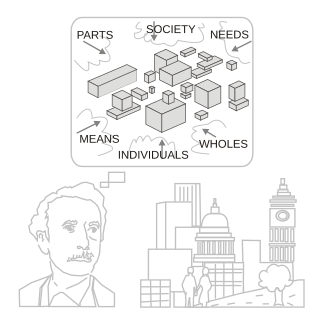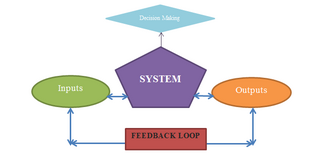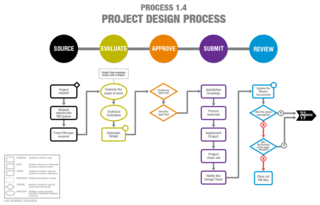Systems theory is the transdisciplinary study of systems, i.e. cohesive groups of interrelated, interdependent components that can be natural or artificial. Every system has causal boundaries, is influenced by its context, defined by its structure, function and role, and expressed through its relations with other systems. A system is "more than the sum of its parts" when it expresses synergy or emergent behavior.
In common usage, evaluation is a systematic determination and assessment of a subject's merit, worth and significance, using criteria governed by a set of standards. It can assist an organization, program, design, project or any other intervention or initiative to assess any aim, realizable concept/proposal, or any alternative, to help in decision-making; or to generate the degree of achievement or value in regard to the aim and objectives and results of any such action that has been completed.

In the field of management, strategic management involves the formulation and implementation of the major goals and initiatives taken by an organization's managers on behalf of stakeholders, based on consideration of resources and an assessment of the internal and external environments in which the organization operates. Strategic management provides overall direction to an enterprise and involves specifying the organization's objectives, developing policies and plans to achieve those objectives, and then allocating resources to implement the plans. Academics and practicing managers have developed numerous models and frameworks to assist in strategic decision-making in the context of complex environments and competitive dynamics. Strategic management is not static in nature; the models can include a feedback loop to monitor execution and to inform the next round of planning.

The Fifth Discipline: The Art and Practice of the Learning Organization is a book by Peter Senge focusing on group problem solving using the systems thinking method in order to convert companies into learning organizations that learn to create results that matter as an organization. The five disciplines represent classical approaches for developing three core and timeless learning capabilities: fostering aspiration, developing reflective conversation, and understanding complexity.

Systems science, also referred to as systems research, or, simply, systems, is a transdisciplinary field that is concerned with understanding simple and complex systems in nature and society, which leads to the advancements of formal, natural, social, and applied attributions throughout engineering, technology and science, itself.
Soft systems methodology (SSM) is an organised way of thinking that's applicable to problematic social situations and in the management of change by using action. It was developed in England by academics at the Lancaster Systems Department on the basis of a ten-year action research programme.
Adaptive management, also known as adaptive resource management or adaptive environmental assessment and management, is a structured, iterative process of robust decision making in the face of uncertainty, with an aim to reducing uncertainty over time via system monitoring. In this way, decision making simultaneously meets one or more resource management objectives and, either passively or actively, accrues information needed to improve future management. Adaptive management is a tool which should be used not only to change a system, but also to learn about the system. Because adaptive management is based on a learning process, it improves long-run management outcomes. The challenge in using the adaptive management approach lies in finding the correct balance between gaining knowledge to improve management in the future and achieving the best short-term outcome based on current knowledge. This approach has more recently been employed in implementing international development programs.
Systems philosophy is a discipline aimed at constructing a new philosophy by using systems concepts. The discipline was first described by Ervin Laszlo in his 1972 book Introduction to Systems Philosophy: Toward a New Paradigm of Contemporary Thought. It has been described as the "reorientation of thought and world view ensuing from the introduction of "systems" as a new scientific paradigm".
Holocentric is a philosophical position which focuses on solutions as the outcome of human agency and on critical thinking.
A glossary of terms relating to systems theory.

Regenerative design is about designing systems and solutions that work with or mimic the ways that natural ecosystems return energy from less usable forms to more usable forms. Regenerative design uses systems thinking and other approaches to create resilient and equitable systems that integrate the needs of society and the well-being of nature. Regenerative design is an active topic of discussion in engineering, economics, medicine, landscape design, food systems, and urban design & community development generally.
Interactive planning is a concept developed by Russell L. Ackoff, an American theorist, early proponent of the field of operations research and recognized as the pioneer in systems thinking. Interactive planning forwards the idea that in order to arrive at a desirable future, one has to create a desirable present and create ways and means to resemble it. One of its unique features is that development should be ideal-oriented. Interactive planning is unlike other types of planning such as reactive planning, inactive planning, and preactive planning.

Decision intelligence is an engineering discipline that augments data science with theory from social science, decision theory, and managerial science. Its application provides a framework for best practices in organizational decision-making and processes for applying computational technologies such as machine learning, natural language processing, reasoning, and semantics at scale. The basic idea is that decisions are based on our understanding of how actions lead to outcomes. Decision intelligence is a discipline for analyzing this chain of cause and effect, and decision modeling is a visual language for representing these chains.
A social-ecological system consists of 'a bio-geo-physical' unit and its associated social actors and institutions. Social-ecological systems are complex and adaptive and delimited by spatial or functional boundaries surrounding particular ecosystems and their context problems.
Systems-oriented design (SOD) uses system thinking in order to capture the complexity of systems addressed in design practice. The main mission of SOD is to build the designers' own interpretation and implementation of systems thinking. SOD aims at enabling systems thinking to fully benefit from design thinking and practice and design thinking and practice to fully benefit from systems thinking. SOD addresses design for human activity systems and can be applied to any kind of design problem ranging from product design and interaction design through architecture to decision-making processes and policy design.
Design for lean manufacturing is a process for applying lean concepts to the design phase of a system, such as a complex product or process. The term describes methods of design in lean manufacturing companies as part of the study of Japanese industry by the Massachusetts Institute of Technology. At the time of the study, the Japanese automakers were outperforming the American counterparts in speed, resources used in design, and design quality. Conventional mass-production design focuses primarily on product functions and manufacturing costs; however, design for lean manufacturing systematically widens the design equation to include all factors that will determine a product's success across its entire value stream and life-cycle. One goal is to reduce waste and maximize value, and other goals include improving the quality of the design and the reducing the time to achieve the final solution. The method has been used in architecture, healthcare, product development, processes design, information technology systems, and even to create lean business models. It relies on the definition and optimization of values coupled with the prevention of wastes before they enter the system. Design for lean manufacturing is system design.
Integrated modification methodology (IMM) is a procedure encompassing an open set of scientific techniques for morphologically analyzing the built environment in a multiscale manner and evaluating its performance in actual states or under specific design scenarios.

Raymond L. Ison is an Australian-British cybernetician, systems scholar/scientist, and Professor of Systems at the Open University in the UK. He is currently President of the International Federation for Systems Research (IFSR). He was also Professor Systems for Sustainability at Monash University, and fellow at the Centre for Policy Development, and President of the International Society for the Systems Sciences in the year 2014-15. He is known for his work on systems praxeology within rural development, sustainable management, systemic governance and the design and enactment of learning systems.

Harbarian process modeling (HPM) is a method for obtaining internal process information from an organization and then documenting that information in a visually effective, simple manner.
Systemic intervention is a deliberate operation by intervening agents that seeks people to make alterations in their lives in psychology. This analyses how people deal with challenges in the contemporary era, including their power relations and how they reform relationship with others. Midgley ventured new approach to systems philosophy and social theory that could develop variety usage of the multiple strands of systemic thinking to systemic intervention. Scientific methods could be used as a segment of the intervention practice. However, it does not deal with all of the problems of systemic thinking as well as the science complexity.








